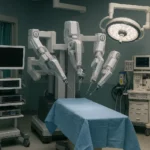Cancer Treatment: Breakthrough Non-Surgical Options in India
Surgery, chemotherapy, or radiation: Just so much cancer treatment. For decades, these have been the classical forms of therapy. But now fast is the world of oncology. Increasingly, patients who are beating cancer do so without ever setting foot in an operating room. With therapies changing so rapidly, they now ask: “Do we even really need to operate? With these policies come a few things: targeted therapy, immunotherapy.”
Rethinking Cancer Treatment: Enter Precision Medicine
Previously, cancer treatment was largely generalised, where what worked with one patient with a particular type of cancer was tried with the next. However, we are now in the world of precision medicine, which means that treatment is tailored to each patient on the basis of their genes, lifestyle, and individual behavior of their cancer cells. With this shift, treatment replacing invasive procedures with non-surgical therapy in cancer will offer hope and improved outcomes.
Targeted Therapy: Attacking Cancer at Its Core
This targeted cancer therapy is like using a sniper instead of a bomb, as opposed to conventional treatments that destroy both healthy and sick cells. It focuses on some specific genes, proteins or pathways that cancer cells utilise to grow and spread and inhibits those pathways. ⠀
For example, women with HER2-positive breast cancer or people with EGFR-mutated lung cancer can tremendously benefit from the targeted therapies that inhibit those unique mutations.
These therapies have less toxicity and are better tolerated, and in most instances, have better long-term outcomes than conventional chemotherapy.
It may not be everybody’s option, but targeted therapy has become a strong contender-especially in combination with other treatment modalities.
Immunotherapy in Cancer Treatment: Helping the Body Fight Back
Indeed revolutionary is the therapy of immunization for cancer. It trains the immune system to recognize, fight and destroy the indisputable mass, rather than taking direct action on cancer. This, while often difficult for the immune system to do on its own.
There are several types:
- Checkpoint inhibitors: These release the brakes on your immune cells.
- CAR-T cell therapy: This reprograms your own T-cells to fight cancer more aggressively.
- Monoclonal antibodies: These attach to cancer cells and flag them for destruction.
In recent years, surgery-free therapies have brought about miraculous recoveries in patients with melanoma, non-small cell lung cancer, kidney cancer, and even bladder cancer; in some cases, complete remission is achieved by these means.
Traditional oncology is cutting into the body for therapeutic purposes; this, however, is biological warfare from the inside—out.
Immunotherapy vs Chemotherapy: A Smarter Cancer Treatment Approach
Both therapies aim to kill cancer, but how they do it makes all the difference.
| Aspect | Chemotherapy | Immunotherapy |
| Method | Kills rapidly dividing cells | Boosts immune system to fight cancer |
| Side Effects | Hair loss, fatigue, nausea | Fatigue, inflammation, but less damage to healthy cells |
| Targeting | Non-specific | Specific to immune checkpoints or cancer cells |
| Duration | Cycles over weeks/months | May require fewer sessions but longer follow-up |
The key takeaway? Immunotherapy is more focused, and for many cancers, far less debilitating.
When Can You Avoid Surgery in Cancer Treatment?
There was a time when surgery was the first line of defense against solid tumors. But with modern advancements:
- Some early-stage cancers are managed with targeted drugs alone.
- Patients unfit for surgery due to age or health can now rely on non-invasive therapies.
- Advanced cancers that were once considered untreatable are now controlled or even cured without a scalpel.
That does not mean oncology surgery is obsolete — but for many, it is no longer the only option.
Who Can Benefit from These Therapies?
The decision to go non-surgical depends on:
- Type of cancer (some respond better to immunotherapy or targeted therapy)
- Genetic mutations present in the tumor
- Stage of cancer
- Overall health of the patient
Earlier molecular testing and an analysis of the biomarker are why they are essential before therapy initiation. This means an assessment can be made by your physician regarding how good of a candidate you are for such advanced therapy.
Risks and Side Effects: The Honest Truth
No cancer therapy is risk-free.
Targeted Therapy:
- Rash
- Diarrhea
- Liver issues
- Resistance over time
Immunotherapy:
- Inflammation (lungs, liver, intestines)
- Autoimmune reactions
- Fatigue
That being said, these effects would, in most cases, be less difficult to endure than the usual side effects associated with traditional chemotherapy or recovery from an oncology surgery. Most side effects experienced can be managed without halting the progress of the therapy.
The Future: A World Without Cancer Surgery?
Not yet — but we are getting there.
Meanwhile, ongoing research in immunotherapy, gene therapy and next-gen targeted drugs is pushing us closer to a world where cancer can be treated without invasive procedures.
Furthermore, with AI-driven diagnostics and growing use of big data in oncology, treatment will only become more refined, personalised and effective.
Are These Treatments Affordable and Available in India?
This is how India stands when it comes to the global cancer treatment landscape.
Most of the advanced therapies that these top places for cancer treatment in India offer are available at a fraction of the cost you would pay in any of the western countries. India has evolved from having the latest and most sophisticated diagnostic labs to achieving access to international drug protocols — indeed a heaven for inexpensive but high-quality cancer care.
Some of the best hospitals for cancer treatment in India include:
- Tata Memorial Hospital, Mumbai
- AIIMS, New Delhi
- Apollo Cancer Institutes
- Max Super Specialty Hospital, Delhi
- Fortis Memorial Research Institute, Gurgaon
- Rajiv Gandhi Cancer Institute
- Medanta The Medicity, Gurgaon
If you’re looking for the best cancer hospital in India or even the best cancer hospital in Delhi, these institutions are at the forefront of innovation in cancer therapy treatment.
Why Should You Choose Regimen Healthcare?
At Regimen Healthcare, we don’t just connect patients to hospitals — we guide them through the journey.
- We help identify the right specialists for your type and stage of cancer.
- We arrange comprehensive diagnostics, including genetic profiling.
- We partner with the best hospitals for cancer in India.
- We ensure affordability without compromising quality.
- We handle everything from visa assistance to airport pickup, accommodation, and follow-up care.
Your treatment should be about healing — not paperwork. That’s our job.
Conclusion: The New Era of Hope in Cancer Treatment
Surgery proved its worth in saving lives, but it is no longer the only weapon in the armory against cancer. With the advent of immunotherapy and targeted therapy for cancers, we really are armed with mighty weapons that are redefining the conceivable in oncology. These weapons are prolonging life, rendering life bearable, and installed with a degree of hope due to noninvasive or minimally invasive techniques.
If you or a loved one are considering treatment options, it often brings up the question: Do I need surgery, or are there any alternatives?
Want to explore non-surgical cancer treatment options like immunotherapy or targeted therapy?
Need access to the best cancer hospital in India at affordable rates?
Looking for personal guidance in choosing the right path?
📞 Connect with Regimen Healthcare now for expert consultation and global-standard care — right here in India.
📧 Drop us a message or call our care team today!
👉 Book a free consultation with our medical experts.
📩 Email us: [email protected]
📞 Call or WhatsApp: +91-9310356465
🌐 Visit: www.regimenhealthcare.com
FAQs: All You Need to Know About Modern Cancer Treatment
1. Can I treat my cancer without surgery?
Yes, depending on your cancer type and stage. Many patients now benefit from non-surgical options like immunotherapy and targeted therapy.
2. Is immunotherapy better than chemotherapy?
It can be, especially in cancers like melanoma and lung cancer. It boosts your immune system rather than attacking all fast-growing cells.
3. What are the side effects of targeted therapy?
They are generally mild but may include rashes, diarrhea, or liver issues. They’re often manageable.
4. How do I know if I’m eligible for these treatments?
A genetic test or tumor profiling helps doctors decide if these therapies are right for you.
5. Is India a good place for cancer treatment?
Absolutely. India offers world-class cancer care at affordable prices, with hospitals ranked among the best globally.
6. What’s the cost of immunotherapy in India?
Costs vary, but it’s significantly lower than in the US or UK. Regimen Healthcare can help find the right options within your budget.
7. Can targeted therapy cure cancer?
It may not always cure, but it can significantly control the disease, extend life, and improve quality of life.
8. Which cancers respond well to immunotherapy?
Lung cancer, melanoma, bladder cancer, kidney cancer, and some blood cancers have shown good response rates.
9. Are these treatments available in government hospitals?
Some are, but many advanced therapies are more widely available in top private hospitals.
10. How can I start treatment through Regimen Healthcare?
Just contact us — we’ll guide you from your first consultation to post-treatment recovery.









